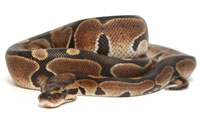The U.S. Fish and Wildlife Service gets an earful.
The U.S. Fish and Wildlife Service's Notice of Inquiry (NOI) regarding Boa, Python and Eunectes constrictors generated more than 1,300 responses. Reptile retailers, importers, online businesses, herp societies, hobbyists and organizations voiced their opinions and findings.

The Pet Industry Joint Advisory Council estimated 5,100 retailers and 2,000 to 5,000 hobbyists, among other sources, sell or breed Boa, Python and Eunectes constrictors. A ball python is pictured.
USFWS announced the NOI in the Jan. 31 issue of the Federal Register. Hoping to better understand the potential environmental impacts of released pet snakes, the agency accepted public comments through April 30.
Besides answering questions posed by USFWS, many responses addressed the possibility of the three constrictor genera being added to the list of injurious wildlife under the Lacey Act. If enacted, the listing would prohibit or severely limit the importation and transportation of these snakes.
Although some respondents, such as the National Environmental Coalition on Invasive Species, were in favor of such a listing, most of the letters REPTILES read were against it. “These species do not pose a national-level threat to wildlife or wildlife habitat,” wrote the Pet Industry Joint Advisory Council. Drawing off four months of research, PIJAC noted only two large constrictor subspecies, Python molurus bivitattus and Boa constrictor constrictor, have established feral populations in the United States. Both are in Southern Florida. A Lacey Act listing would not help reduce or eliminate these feral populations, PIJAC wrote, but it could cause significant economic losses to reptile-related businesses. The association estimated 5,100 retailers and 2,000 to 5,000 hobbyists, among other sources, sell or breed Boa, Python and Eunectes constrictors.
Writing on behalf of the Association of Zoos and Aquariums, Steve Olson also stated the issue wasn’t a national one. “This is a Florida issue and should be treated as such through the State regulatory process,” the vice president of government affairs wrote. He added that if Boa, Python and Eunectes species were added to the list of injurious wildlife, it could cause permitting delays that might disrupt AZA species-conservation programs.
Clearly, people with business interests responded to the NOI, but hobbyists such as Maryland’s Nor Eldridge also took the time to write. “You will find that we in the reptile community are just as committed to stopping the spread of invasive species as you are,” wrote the keeper and breeder of crested geckos and ball pythons. “First and foremost, reptile enthusiasts love animals and the environment. We would like to be seen as part of the solution instead of part of the problem.”
To read these letters and others, visit www.regulations.gov.


